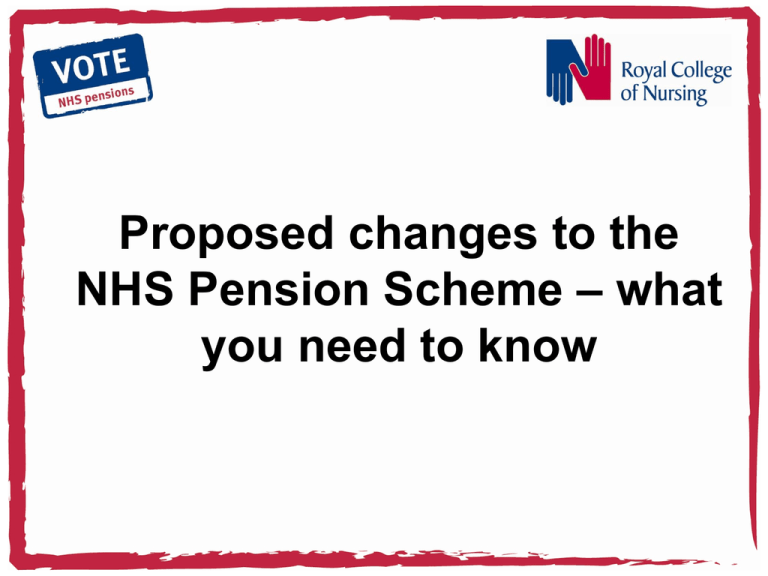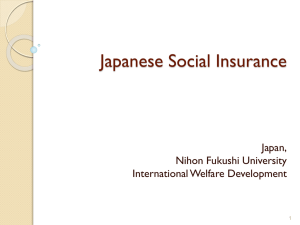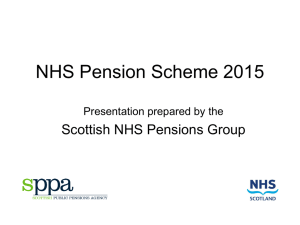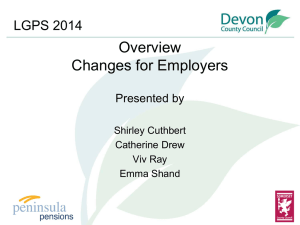Proposed changes to the NHS Pension Scheme
advertisement

Proposed changes to the NHS Pension Scheme – what you need to know What would the scheme look like from April 2015? • Career average pension scheme (CARE) • Annual accrual rate of 1/54th • Pension earnings uplifted by Consumer Price Index (CPI) plus 1.5% • Normal Pension Age (NPA) of 65 or the state pension age (rising to 66 by 2020,67 by 2028, and 68 by 2046) • Pensions in retirement increased by CPI • Access to NHS pension scheme for those TUPE’d out of the NHS • The Government has pledged that there will be no more fundamental changes to the scheme for 25 years from 1 April 2012. Increase in employee contributions • Average contributions of 9.8% by 2014 • Increase to 9.8% average over 3 years ; 2012/13, 2013/14, and 2014/15 • Higher paid to pay more and lower paid to be protected • Nurse on £30,000 now pays around £1950pa (gross). By 2014, this will be around £2940 (gross) - an increase of £970. What is ‘Full Protection’? • Those due to reach pension age within ten years from 1 April 2012 will remain in their current scheme and be able to retire at their normal pension age (NPA). • MHOs will continue to ‘double up’. • Everyone will have to pay any expected increase in employee contributions. • NPA is either 55 (Special Class and MHO) or 60 in the 1995 section and 65 in the 2008 section. The ‘taper’ • Those that are due to reach their pension age 3.5 years after the ten years from 1 April 2012 have expired will also receive some protection. • Effectively those in the taper will move to the new scheme at some point after 1 April 2015 – when the new arrangements are scheduled to take affect. • Unlike those receiving full protection, MHOs will not continue to ‘double up’ but will get some benefit from ‘Uniform Accrual’ • The nearer someone is to the ten years from 1 April 2012, the later they will transfer to the new scheme. • All service until transferring to the new scheme will be ‘fully protected’ at current NPA. The ‘final salary’ that will be used to calculate this element of their service will be the ‘final salary’ at actual retirement. Examples of the ‘taper effect’ Years to pension age after ten years from 1 April 2012 Date of switch to the new pension scheme 3.5 years and over Move to the new section on 1/04/ 2015 3 years 1/04/2016 2.5 years 1/04/2017 2 years 1/04/2018 1.5 years 1/04/2019 1 year 1/04/2020 O.5 years 1/04/2021 What happens when I retire? • If you are ‘fully protected’ you will retire as planned on your current arrangements • If you are in the current scheme and transfer to the 2015 section and then retire…. …your pension will be made up by: – Service in the old section: fully protected at the NPA and calculated at your final salary, plus... – Service in the 2015 section: built up on CARE at 1/54th with NPA 65 (or equal to the state pension age) – If pension in the 2015 section is taken before age 65 it will be actuarially reduced for taking it early. – When you retire you will take your pension all in one go. You can't take one pension (pre 2015) without taking the other (post 2015) What if you are not in the protected groups? • You will move to the new scheme for ‘future pensionable service’ on April 1 2015. • This pensionable service will have a normal pension age of 65 (or equal to the state pension age) • The pension value you accrue up to 2015 will be fully protected as will the pension age for this service. • Your final salary on actual retirement will be used to calculate this part of your pension. Important information • RCN Council believes that these proposals are the most that can be achieved through negotiation. • Members are being asked to vote on whether to accept or reject the proposals. • Members have until 4pm on 27 February to return their voting paper. • Council will meet on 28 February to decide the next steps. More available information: • A ‘Contribution’ calculator: enabling you to work out how much extra you will pay in contributions from 2012. • A ‘Retirement’ calculator: enabling you to calculate your pension on retirement. • A number of Q&As on the proposals. • Detail on the transition dates to the new section. • A number of films on the proposals and background. www.rcn.org.uk






